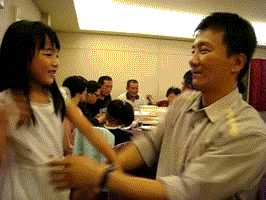I've heard one of the most difficult things in a soldier's career is returning home. One day you're living in constant danger. Every stranger acting suspiciously could be the enemy. Every abandoned car could be a bomb waiting to go off. Even a random cell phone call can mean set off an explosion resulting in imminent death for you and your team. You have to be aware of people creeping up behind you, or hiding in dark corners. The level of alertness, and paranoia must be turned up to 11 all the time.
Then, suddenly you're discharged.
You're thrown back into civilian life. Every day you fight the urge to drop to revert to tactical procedures at the sound of a car engine misfiring, or turn and attack the person responsible for the too-close footsteps behind you. Even though your situation and surroundings have changed, your instincts and conditioning have not changed. You still have the habits, thoughts, and compulsions of a soldier even though danger is no longer imminent.
The stress that comes from having to fight back your most basic instincts on a daily basis can be overwhelming... even debilitating.
This is how I feel when coming out of a strenuous time in a relationship. The sudden transformation that occurs when two people decide to turn what was once a battleground into their home can be very difficult.
Despite efforts to forgive and forget, moving on in a loving way can take time, and often requires patience. Transitioning from a mental and emotional state of danger to safety, chaos to order, hostility to peace, constant suspicion to trust... it's not easy. There are days when I can't hold back the muscle memory. Little things - the tone of someone's voice, or a joke taken too seriously - trigger defense mechanisms that can reignite a war. Suddenly all of the progress towards peace and understanding are forgotten, and we're thrown back onto the battleground.
It's exhausting.
Sometimes I get so tired of fighting (or trying not to fight) that I just retreat and surrender inside myself. I feel safer if I don't do anything. Because if I don't do anything, then then there won't be anything to reignite the conflict.
But alas, it's not that easy. A relationship needs to be nurtured. The act of withdrawing, or not investing in the partnership will destroy it more quickly than anything else.
Here are 5 things I've learned (but not mastered) about healthy ways to fight as a couple:
Don't fight to win. Fight to find a resolution.
When your'e fighting to win, you make your partner your enemy... and the only good thing about having an enemy is when you destroy them in battle.
The problem is that when your enemy is also someone you love dearly, crushing them in battle loses its novelty. It just makes you feel like a jerk. The satisfaction of being "right" is lost in the misery of regrets.
One of the best ways to avoid the need to be right is to change the way you fight. Rather than fighting over small things (ie: who does the dishes, coming home late, or feeling distant) get to the heart of the issue. Maybe someone feels like their efforts to keep the house clean are going unappreciated. Maybe someone the stress of work is causing someone to withdraw physically, and they don't realize it's making their partner feel unwanted. Or maybe days alone with the children is leaving someone is craving a bit more 1-on-1 time.
Rather than accusing each other by saying, "You're not doing enough around the house!" or "You're not coming home on time!" Instead say, "Sometimes I feel like my work goes unappreciated. What would help me feel more loved would be if you ______. or "I miss spending time with you. I know work is busy, but I'd love to get some 1-on-1 time. Can I plan a date night for us?"
There is typically an underlying issue to every squabble that can be resolved with love.
Assume the other person is coming from a place of love.
Something I really struggle with is receiving feedback. Often, someone will come to me in an honest effort to make me aware of something I've done that may have been hurtful, or contrary to what my character.

Rather than appreciating that person for offering me an opportunity for growth, I react as if it were an attack on my character. I get defensive and hurt, even when the feedback isn't meant to be hurtful.
I'm trying to teach myself to take a deep breath after receiving feedback, and recognize the intent behind the critique. For example: If someone tells me something I said was hurtful to them, rather than interpret that as an accusation and act defensively, I am trying to remind myself that this person knows I'm the kind of human that cares about other people. They know I don't want to cause harm (especially with my words), and by making me aware of the situations when I fall short in that area they're giving me an opportunity to improve and grow.
And at the end of the day, becoming the best version of myself is really what's most important to me.
A disagreement isn't resolved with words. It requires action.
Talking about whatever causes conflict is part of reaching a resolution... but it's not the only part.
I've fallen into the trap (over and over and over again) of having a "talk," reaching an understanding and a resolution, feeling peaceful about everything, and then feeling confused and upset when the same conversation repeats itself a week later.
"I thought we already talked about this!"
Well, yes. We did talk about it. But did I do anything about it?
Probably not.
After reaching a resolution through talking, it's my responsibility to take ownership of making a positive change. If something I said caused harm, I need to avoid saying similar things in the future. If something I do (or more realistically, something I don't do) makes someone feel unwanted, then maybe I need to step up my game and make an effort to give more freely of my time, attention, or affection.
Not doing anything to address what caused the conflict in the first place only doubles the pain and resentment the next time it comes up... and it WILL come up.
You can only change yourself.
If you are waiting for the other person to take initiative and be the first to change, you're going to be waiting for a long time.
When we focus on changing the other person in a relationship, we turn into the person who keep score. Suddenly an act of kindness isn't just an act of kindness. It is a manipulation tool we use as leverage over the person we care about. We hold every one of our kind deeds over their head to show them how they are falling short, while you are making great strides.
Or worse...
We start to count the good deeds of our partner. We use their good deeds (or lack thereof) as a constant reminder of how they are falling short of their kindness quota. When we focus on their change (or lack thereof) rather than our own, we can only make them feel less empowered, less adequate, and less lovable.
The best way to inspire someone to change is not to criticize them or guilt them into it. Instead, lead them and guide them with acts love and words of appreciation and gratitude when they show progress.
Don't make it personal.
The worst thing you can do when arguing with someone you love is to take advantage of their most vulnerable weaknesses.
The foundation of love is trust. Creating trust requires a great deal of vulnerability. When you begin taking advantage of someones vulnerabilities, you are sabotaging the very foundation of your love.
Nothing hurts more than watching helplessly as someone you love mercilessly attacks you in the places they know will hurt the worst.
If you want a loving, lasting, healthy relationship, there can be no name calling, bringing up past hurts just to prove a point or cause more pain, playing off of someone's guilt or shame, or exploiting weaknesses.
This type of fighting is the gateway to abuse and can leave deep and lasting scars.
Yes, love can be a battlefield. Conflicts can get heated. People will probably even get injured. But returning home from the emotional warfare doesn't have to be as difficult as it often is. Learning how to fight is one of the things that truly separates the relationships that last from those that fall by the wayside as another statistical casualty.


